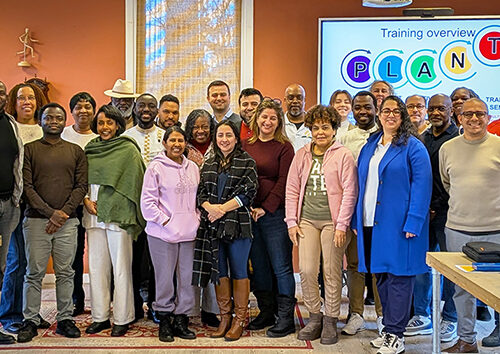26 September 2022 | St Albans, UK [David Neal]
It was earlier this summer in June when a pastor made a visit to an elderly parishioner in his care. This was not his first visit, but on this occasion, he could not help but notice her increasing frailty. As they talked together, no doubt over a cup of tea, he found her in good cheer and noted her “piercingly blue eyes twinkling, that extraordinary smile and the relishing of a quick dry comment.” (1) But as a pastor his was not a social visit, but a spiritual one. He was there to review the details of her funeral.
In many ways this funeral would be unlike any other. It would take place in a large 800-year-old church. Her extended family would be surrounded and supported by members of twenty-three foreign royal families, emperors and kings, presidents, and prime-ministers – and leaders representing two hundred countries and territories. In front of the great and the good from every nation, with leaders of world faiths, Baháʼí, Zoroastrian, Buddhist, Sikh, Hindu, and Muslim, in addition to Christian leaders in attendance. Thousands would stand outside the church, hundreds of thousands more would line the streets of the city, and millions more would watch globally.
It was a reality his parishioner was aware of. Her funeral was to be a witness to the world, and she was determined to ensure that no one, of all faiths and none, king, or commoner, would lose sight of the One for whom this worship service was intended – the Lord himself.
As they talked together, they reviewed the three familiar hymns to be sung; ‘The day though gavest, Lord, is ended;’ ‘The Lord’s my shepherd;’ and ‘Love divine, all loves excelling.’ Each with lyrics expressing her humanity, the temporary nature of this life, how even ‘earth’s proud empires, pass away’, and how with a sense of thankfulness she could testify to God’s, ‘goodness and mercy’ throughout her life, hoping in her physical frailty that she would be one day be ‘changed from glory into glory’, with the invitation to ‘cast her crown’ before Him.
In addition, there were to be numerous readings of Scripture about her hope in Christ and the promise of eternal life. The pastor’s heart warmed. How easy it could be for her funeral to be “all about her,” but that was not what she wanted. Rather, it was to be in many ways the final statement of her calling – all about Him.’
When the visit came to an end, the pastor said goodbye, encouraged by their time together. It had been a positive visit. “I came away thinking there is someone who has no fear of death, has hope in the future, knows the rock on which she stands and that gives her strength.” The conversation was, of course, between Archbishop Justin Welby, and Her late Majesty, Queen Elizabeth II. (2)
On Death, Dying, and the Future Hope
Few of us enjoy conversation around the one certainty we are all destined to face at some time or another. It is a matter we seek to avoid at all costs, and if possible, try not to think about due to the sadness and associated fears.
Is it possible to have ‘no fear of death’? Is it possible to ‘be ready to die’? It is perhaps timely that in the coming series of Sabbath School Lessons beginning October 1st, Seventh-day Adventists around the globe will consider the subject of “On Death, Dying and the Future Hope”, with special emphasis given to “the mortal nature of human beings and how the resurrection is the condition for immortality. The study is built on the hope and premise that, “We should not fear death because Christ died for us and overcame the power of death. Actually, we are assured that He holds “the keys to death and to the place of the dead” (Rev. 1:18, NCV). (3)
The introduction to this new series of lessons continues, “Expressions of death can be seen all around us. Our world is full of suffering and tears. We need assurance in the present and hope for the future. We will explore the painful subject of death, but through the lens of the hope offered us through Jesus.”
It would be easy to see this series of studies as the opposite of uplifting and inspiring – not least because it is a matter most would prefer to avoid. We also need to recognise that for some, these studies could bring to the surface painful memories of loss, from the recent or even distant past.
But from another perspective, the mindset the late Queen Elizabeth II is helpful as we approach this study series together, how a global event becomes a timely teachable moment – as He was ‘her rock,’ may He be ours.”
As a new resource for tedNEWS readers, we are sharing in agreement with ‘It Is Written TV’, their weekly Sabbath School study. Hosted by It Is Written Associate Speaker Eric Flickinger, this quarter’ programmes feature the lesson author, Dr Alberto Timm, with the purpose of “digging deeper into each week’s lesson and providing additional insights into the topic at hand.”
In our time, there are an abundance of options to choose from, for Sabbath School study resources with live study groups, radio broadcasts, podcasts, and tv presentations. We have chosen to highlight the “It is Written TV” resource for their discussion and reflective approach, particularly in conversation with the author of the series of studies under consideration.
- Queen had no fear of death says archbishop of Canterbury, The Guardian, 9 September 2022.
- Ibid.
- Introduction to the Q4 2022 Sabbath School Study Guide which, along with all thirteen lessons, can be downloaded here.
[Photos: Shutterstock and Pexels]





